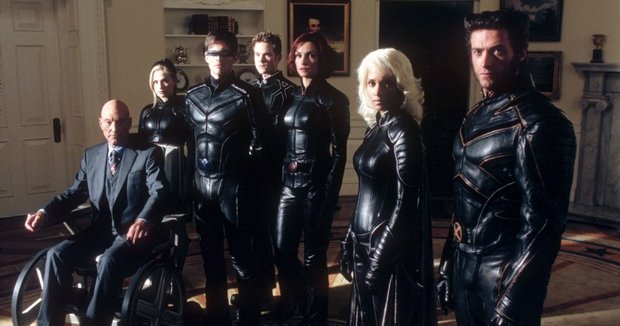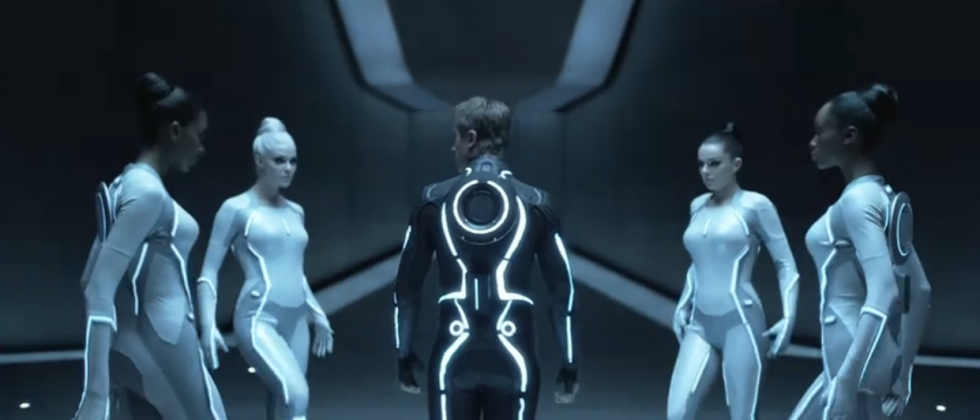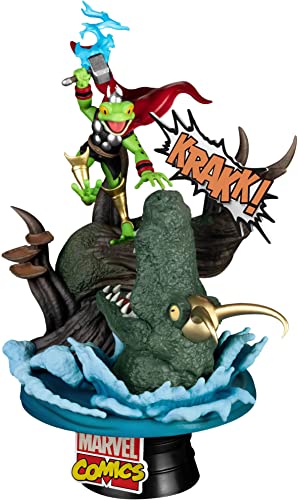Honestly, the world isn’t what it was. There was an enthusiasm from around 2004 to 2012 or so that has abated everywhere. The culture had a positivity that no longer manifests with the same power. I don’t know if it simply turned insular or if it vanished completely. What I know is that it’s not anywhere I used to be able to find it.
I've talked about this before in other places, and it's absolutely true. Here there was a discussion of aesthetics by the decade, and it's arguable that after the 00s ended, that ceased to be. In the late 90s and early 00s there was this belief that the future was here. It was the new millenium, the internet was getting in everyone's homes, and we were all bracing ourselves for the "next step". The aesthetic of the time was either angst-driven subculture dressed in all-black, or a genuine optimism. Money was everywhere, fast cars, tall skyscrapers, lights everywhere; the world was becoming a big playground. Then the dot-com bubble happened, 9/11, the 2007-8 financial crisis and so on. The thing is, before 2007/8, the aesthetic was still felt. 9/11 gave rise to a more "Murica, F'Yeah" narrative in media, which were still "entertaining" to the average person. It's how we got the Bay blockbusters of time, that pretty bad GI Joe flick, Black Hawk Down, etc. But still, the aesthetic was there.
What was that aesthetic? The tail end of the 90s had all those films like American Beauty, Office Space and Fight Club, about how the comfortable daily life had become too empty, with the MC finding solace in an alternative, more "free" and masculine of sorts environment. The comics and games of the time were about hot people in leather being cool and making their own rules. Explosions, widescreen optics and general abundance was everywhere. The X-Men, which essentially begun the summer capeshit blockbuster, weren't colourful capes, they were aesthetically pleasing paramilitary groups fighting for the future. And that was the general feel of the era. The future was coming, day by day. You can watch things like K-Pax, The Beach, Vanilla Sky or The Island, and notice that there was this sense of "heightened reality". The skies and seas were bluer, the lights brighter. The filters tried to make it all look like a big commercial of a better way. The defining trait of the era was the light. Blue, white, yellow, whatever, it was there. It's why we had the Abrams Flares. Still, I'd say Bay's Island realy captured what I'm talking about:
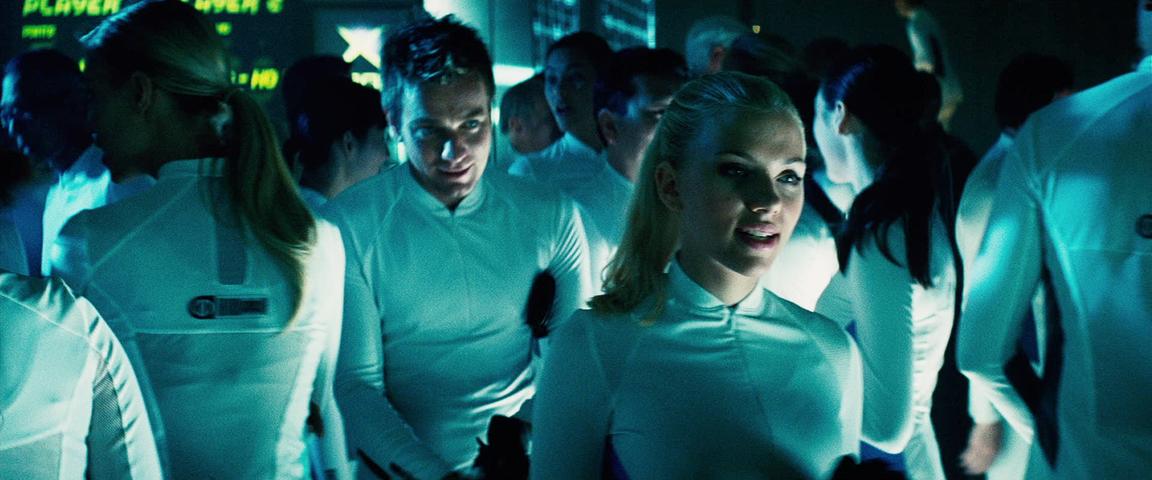
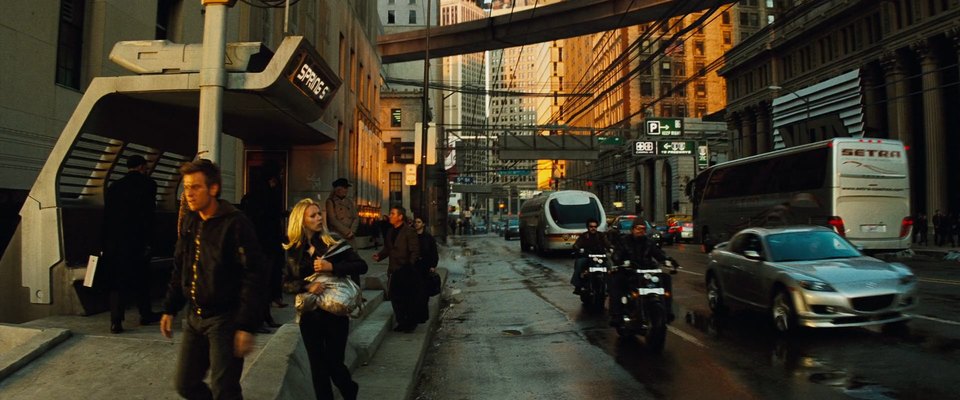
(I'll be copying and pasting some stuff from my previous post here, as it's the same point I want to make)
It was futuristic, but not utterly alien. In a way, I'd describe it as the "updated" 00s version of the 50s. Look at the Sci-Fi of the time and you'll notice it had that Art Deco, "50s... but in SPACE" look to it all. Generally, the 00s still had a distinct look to them, I'd say. And that was a "realistic" view of the future. Fllowing the patterns and going "yeah, we're not going to have a Feudal Empire, but we'll get those sleek bodysuits and flying cars". The future could've been pesimistic, like in Minority Report, but it was still something tangible. At least in Sci-Fi. In the actual world you again had this obsession with getting more and more "sleek". The gloss that was everywhere. It's called the Y2K Aesthetic and I think it fits.
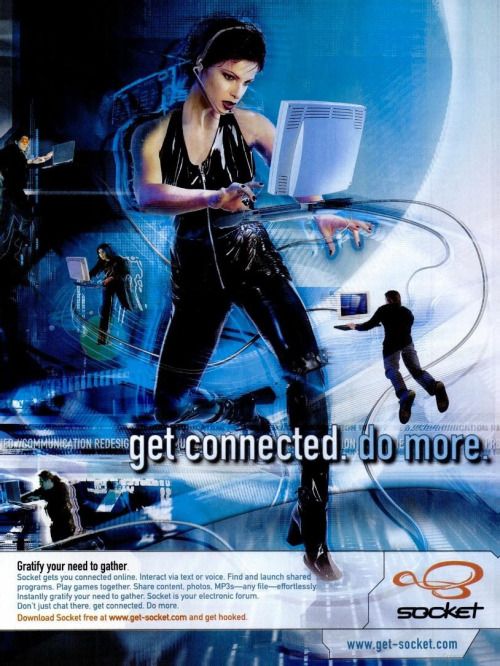
And you know what, I still like it. It does feel futuristic and it has its own flair. It's not generic, like pulp sci-fi or just "puts some guns and whatever in space and some power armours or something". You know that the leather's from the 90s, the clear plastic is from the early 00s, it does give you a resemblance of a specific point in time. I think the whole Blackberry Vs. Apple thing perfectly encapsulates that too. Blackberry was sleek, and had lots of buttons, giving the illusion that it was super-duper-hi-tech and sophisticated. Compare that to the old Nokia mobiles, the flip-phones and whatnot, the Blackberry was seen like a pocket-sized computer. Then the iPhone came about and it put a new meaning in "sleek". It was so advanced it didn't need buttons. It didn't need a design. It was a smooth surface; period. And people got hooked. Say what you will about Jobs, but the man was a marketing genius and I admire him for that. More than Gates, anyhow.
Beyond that, the 00s had the fallout of 9/11 and it was reflected in everything. You had both unironic pro-millitary propaganda and also lots of satire. You had Secularism Vs. Religion which really drove those early Atheist personalities all over the net. You had stuff like 24 that while dealing with deep state conspiracies, ultimately wanted to tell the audience that those Three-Letter-Agencies were there to protect the people. Halo was directly influenced by the wars of the time. You had Modern Warfare taking the world by storm. IMO, MGS is the most 00s franchise I can think of. MGS2 especially tapped into things that were just beginning then, but are extremely relevant today. Nolan's BatFilms deal with those themes as well. TDK is about an uber-billionaire becoming big brother. Batman being in an all-black power armoured version of the 90s/00s leather wasn' random. For me, the 00s ended in 2010.
Iron Man was the last franchise to be directly influenced by the events and look of the early 00s. And IM2 carried that over, by continuing the militaristic storyline with the Power Armour Wars. Back then we thought Power Armours would be the next big breakthrough, instead of drones. When IM3 rolled around all basis in reality was gone and we had magic serums regrowing lava arms. IM 1 & 2 were still products of their own time. The IM2 expo with American-Flag Bikini Girls dancing, the glorification of Stark's billionaire lifestyle, it all was the last stretch before Occupy. More than that, the armours felt real. They were big, they were somewhat "clunky", they had weight. It's no stretch to say that Stark influenced a lot of kids heading out of High School and going into Engineering. Hell, doesn't anyone remember the Engineering craze of the 10s? That was a direct result of things like Iron Man and the general secular culture developed in the 00s. IM was the last "true" product of the 00s.
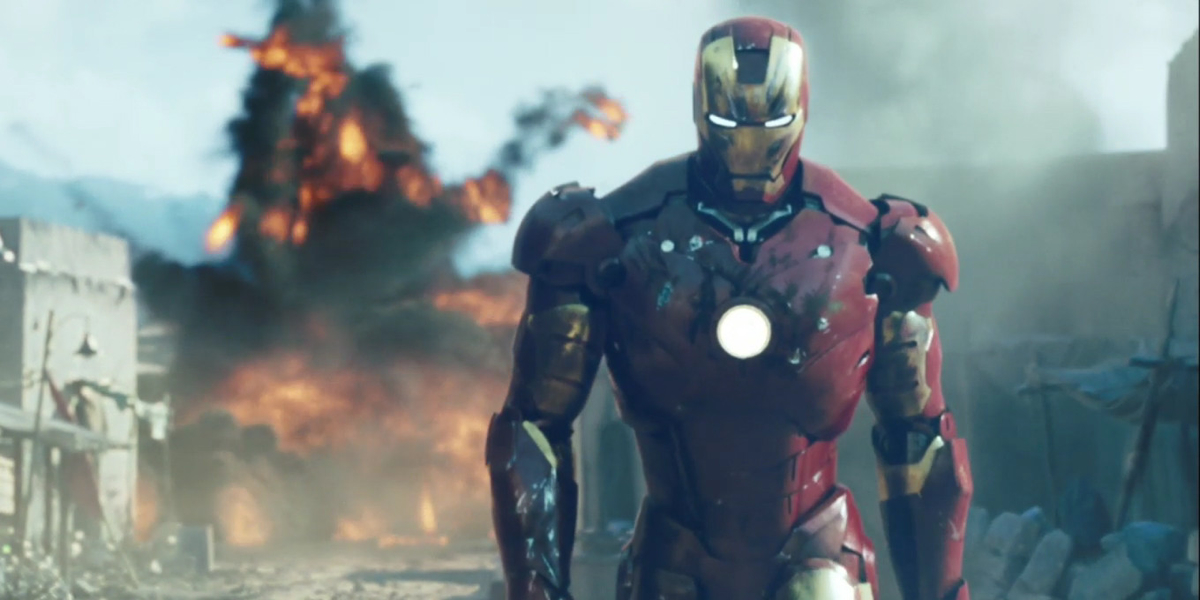
Moving on, 09 Trek still had that lens flare, early 00s look. The "grittier" lighing but with the vibrant colours popping out. Avatar most certainly was the last 00s "epic blockbuster". The human tech looks straight out of Halo and Pandora is a SolarPunk painting come to life. It's a Sci-FI Dances With Wolves, with an added Post-9/11 look and environmentalist message. And finally, Tron Legacy took the Y2K Aesthetic, made it more futuristic, and closed the decade completely. Maybe that's why I have such a soft spot for Tron and love it so. I don't know. You could argue that it started with the X-Men. Directly influenced by the 90s, they begun the 00s.
Now look at Tron Legacy:
It's the last step of that aesthetic. Going from the "retro" and relatively realistic look of the era, and making it actually futuristic. You can see how it's similar to both the X-Men and the Matrix (late 90s/early 00s) and the Island (mid-00s) while also taking it a step further. It's the culmination of all the 00s looks. So, yeah, I'd say the 00s had their own "thing". It's something you can revisit. It's an actual aesthetic, at the end of the day.
In contrast, the 10s really had nothing. There was no massive event that really changed the landscape. There was the 2008 crash, and there were real ramifications, but there was no impact on pop culture. If anything, it all went straight to "party like there's no tomorrow". Occupy happened and then it all moved to idpol. What do I remember about the 10s? The 2012 hysteria that got some suckers scammed, hipsters, raves, things like YOLO and general memespeak becoming normie-friendly, but apart from that I can't tell you what the "feel" of the 10s was. There was no unifying theme across all media. No defining franchise or genre. In the 00s you had Sci-Fi going through a long stretch, you had historical epics trying to make a comeback like in the old Hollywood days, and you had the militaristic aesthetic due to 9/11. The 10s were empty, but the culture wars kept ramping on, which is why we are where we are. One could argue the 10s went through more rapid, real world changes, but in terms of having a set "identity", I'd say there's nothing you can point at and go "yeah, that's so 10s". I can name movies that capure the 00s pefectly, in style or period. But with the 10s I have no clue.
It's honestly pretty funny how our likes and dislikes are so heavily attached to our times. I still have a nostalgia for the 90s/00s, and by extension have it for the products, events and "feel" of the times too. And the same goes for the 80s people and so on. Well, at least we can all agree the 10s were utterly creatively bankrupt.
------
So, with this done, what does it all mean? I know a lot of people will just say that I'm nostalgic for my youth, but it's not just that. Go back and look at the corporate culture. Ads were centered around beautiful people, in beautiful locations, living beautiful lives. They were tying to sell you that. Were you going to get it? Doubtful. But the point was that you were trying to reach something "better". You wanted to be fitter, more handsome, richer, and so on. What are the ads like now? Fat, ugly people doing some silly dances. Focusing that it's "alright" to be weak, fat and ugly. It's okay to just be "you", because "you" are just a fat, ugly slob. And it works. The average consoomer likes it. Seeing a beautiful model makes a woman feel inadequate, it makes a man feel threatened. But hey, you'll say, "celebs are still as pristine as ever" and you'd be right. That's the genius of it. The ads are not threatening. The don't make you feel sad that you're not as good as the people in them. Meanwhile you still watch those movies, shows and whatnot. You are still exposed to the beautiful. So you buy. And you don't feel bad about it, because hey, you're not tying too hard because, after all, you're great just as you are...
Fight Club has been talked about to death, but I'd wager it's still relevant. People have many takeaways about the ending, the message and everything, but here's the thing. When Tyler criticised the models in the ads, while being Brad Pitt, the point was that those models were carefully edited and curated. They weren't real. They weren't strong, and they weren't even truthfully that beautiful; it was lighting and editing. You weren't meant to get out thinking "man, **** this ****, it's all a scam", it was meant to make you realise that working out, taking care of yourself, trying to be the best you you can be, was independent of what some company sold you. Now we've swung so far to the other end of the pendulum that such ads are actually healthy messages. I'd rather be jealous of a beautiful person and want to work on myself, than just be told to "accept". Back in the day they sold us beautiful lies, now they're shoving a flawed illusion in front of our faces.
And that can be observed across all media. Back then you had things like *** & The City and Entourage, so I'm not going to argue that it wasn't a consumering-obsessed culture. But that's the thing; they had their bubbles. S&TC was "unique", it was provocative. It was about a bunch of sluts living like sluts and whatever, some people liked it. Entourage was the male S&TC, about a bunch of bros being dudebros and getting ******* and whatever. They were what they were. But now, S&TC isn't unique. The most watched Netflix show ATM is about a married mother who debates whether to choose her long-time husband who's handsome and rich, or her old ex who's two inches taller, has a huge **** and is a bit more handsome I suppose. In the end she decides not to walk out on her husband and children, and instead decides to **** the big dicked guy on the side because that's... good? Somehow? When we've reached a point where the sluts in S&TC are better people than the average protegonist in a current show, there's something wrong.
And that's what's happened to modern boards. There's no freedom, and unironically, no "safe spaces". It used to be that each genre, each "thing" was its own. You walked into a comic book den or a game den prepared to engage with the people who were the core audience. The average comic book fan wasn't the average S&TC viewer and that was alright. Gatekeeping used to exist for a reason. You had to put in the work to prove that you liked that "thing", that you weren't there to laugh at them or just because it was a fad. It was also for you. It allowed you to develop taste, to find out stuff on your own. If you're guided through everything, then you'll never create your own preferences, you'll follow the same road as everyone else. In an effort to make more money, this tactic has been shamed and run to the ground. Now everything's the same, with the same norms and rules, to appeal to as many people as possible, and makes as many money as possible. The problem is, this alienates dedicated fanbases and the newcomers are often tourists who give up the moment the new shiny thing comes along.
I know the responses that will follow, we're all just mad little men angry that icky girls are invading our space. Which really couldn't be further from the truth, and shows that the people who spout this nonsense were never really into this "culture" to begin with. Boys grew up with Lara Croft, not Indiana Jones or Nathan Drake. People watched Alias, Xena and Dark Angel. We loved all that. Why? Because they knew what they were. The female lead was capable and badass, but also sexy. The same way Hemsworth shows up shirtless and pumped full of roids, Jolie wore a padded bra to have bigger ****. They quipped and "put down the silly boys" but they still ended up with the guy tagging along. The same way the prince got with the princess or the MC superhero got with his love interest. Now that's all gone. They've turned female MCs into frumpy, angry women who just quip, face no obstacles and "stick it to the man". People like us used to want girls to be interested in the hobby, nobody turned anyone away. But nobody cared. Nobody wanted to get into our "club". We weren't cool or hip. So we had our own power-fantasies and subcultures and rules and whatever. The same way the fanbases of Trek or S&TC were extremelly different. And that was great. You knew what you were and you engaged with likeminded people.
So what are we left with? The old, hardcore audiences alienated, and new blood that will leave the moment the next fad comes along. They've successfully sold these things to the GA, and they change them because of broader appeal and a couple of complaining internet morons. They change the movies, they change the comics. So now everyone has the same voice, the same beliefs, the same everything. It's why comics don't sell. Those people were never going to buy them, and we're tired. I lived to see Stark go from a melancholic, stoic but charming genius CEO, to a mumbling, depressive, quipping mess. Carol Danvers used to be an Army Brat with alcohol and depression issues who enjoyed slaughtering xenos. Now she's an all-capable stronk womyn who's Tony's role model (thanks Bendis). Why should I care about anything when these characters are basically hollows wearing the skin of corporate mascosts that resemble what I used to like?
How does this relate to forums? Simple. Without each commnunity having its own, unique, rules and conduct, it all becomes a streamlined, pre-approved "discussion" of the same old things. The kind of people that used to populate such places aren't tolerated anymore. Any dissent is not voiced. Why? because if you have a problem with one thing, it's the same problem you'll have with another, and another, and ultimately it leads to the same pre-approved source. Which is a big no-no so it's pruned and you're kicked out, simple as. You're either in or out, there's nothing else. I'll give you a precise example. I was banned from a comic book forum years back. Why? I was talking in a thread one day, about GotG. There was this new account who was going on and on about how the Bendis run was the best. All the older accounts dissagreed, and eventually he/she/they confirmed that they'd never read the DnA run. But still, they wouldn't back down that the Bendis run, that was widely loathed by actual fans beyond the paid corporate reviews meant to promote the upcoming movie, was the best. So I said "**** it" and created a thread asking people to vote and linked to the previous thread. They were adamant that the entire fanbase liked the new one better and it was me and my ilk who were "wrong". Notice that, our taste, curated over years, was "wrong". Wrong. Anyway, a couple of hours later I got a PM that I was temporarily banned because said account had complained for harassment. I told them what went down but still, "harassment". I told them to go **** themselves and got banned properly. I still go back sometimes, to this and others, and you know what I see? All the old accounts banned. All the old faces gone. Threads that used to be "tradition" like sharing art, odd scoups, continuity errors, all gone. Actual discussion is gone. All I see are new accounts talking about the same things you'd see on Tumblr. Old Tumblr anyhow, but I doubt it's changed. It's not nerds discussing how two issues decades apart are connected or ruin a character, it's 15 YO girls shipping genderswapped characters while talking in broken memespeak.
And there you have it. Back in the day discussion would be precise. People would bring up examples, half-forgotten stories and would try to one-up one another. They'd compared collections and tales, because it was a sort of competition. People were invested in those things, they weren't just there because it was a hot new thing. You had to show your investment or be left behind. In sports you have to play better, in math olympiads you have to solve more complex excercises, and in comics you had to show how big a fan you were. That's what gatekeeping is. You preserve what is and has been so that it won't be changed into something unrecognisable. Teams would scan issues by hand and the pirated packs would be shared between the trusted few. It was a true community. And it had its own rules. You could argue, you could dissagree, you could do everything because even if another guy thought you were a "******" for liking X instead of Y, he got that you did so in the same way he did for Y over X. Now it's gone. It's either Z or bust. I'm not going to argue how healthy that was. Obviously the guy spending his time working out and trying to get a gf was spending it much better. But still, it was what some people had and that was fine. That's what capes were and should be. But as time went on, the people that built the industry were forgotten, and we are where we are.
The bottom line is that the world changed. They stopped selling us true power fantasies and started peddling comforting blandness. That's all that it comes down to. They saw that the average person would rather be comforted than challenged. And all those nerdy products revolved around being the best version you could be, so they were changed, alongside society. Working towards a goal isn't "cool" anymore. Wanting something "more" isn't "cool"anymore. For all their faults, consumers of capes and vidya, deep down just wanted to be better than they were. They wanted an escape where they were the muscled genius who got the girl. And that's why the formula didn't work with women or "normal people". Women don't want to feel inadequate. The nerd knew he was inadequate in some areas and either escaped or at least tried a bit to get better. The girl wants to be as is and get it all, which is why female-centered products are things like Twillight, 50 Shades, Gossip Girl and so on. In nerdy products the point is the growth, the pain, the shame, the guilt, everything. And by changing that core, you change it all. So now the nerd doesn't have his escape because Average McNormie has a good enough life to not wish for anything better, and thus the product has to reflect those attributes. The nerd's now again the outcast with no place to go, but hey, Average McNormie can enjoy a very watered down version of [Product] and pretend they're big fans while again ridiculing the nerd, this time not for being a comicfan, but for being a "wrong" kind of comicfan, since Average McNormie is a "huge comicfan" and obviously knows what "wrong comicfans" are like.
I know a lot of people will say it's just time moving on and "my kind" becoming outdated, looking in the past with rose tinted glasses. But this time it's different. They didn't have computers and the internet in 1500. They didn't have people being connected to one another, from every part of the world, 24/7. Something that happened in the very North didn't immediately have an effect in the far East. There's extreme connectivity now. Things are different. I'm not going to get into politics, everyone has their own opinions on how Y is the ultimate culprit, X can save us, Z is the actual solution if only U, and so on and so forth. I'm just trying to say that in this current world of rapid changes, it's not really a case of not being "with it" and looking back to when you were "in". We're talking about specific issues that can be observed by anyone who's paid attention to them or was involved as the years went by.
It used to be how you had various friends that you used to talk about different topics with. You had this common with one person, that with another, and so on. And those common things were what they were. In the current world you're trying to talk about everything, with everyone, at the same time, so all things are stripped of their unique and "problematic" qualities until they're all the same vague "thing" that can easily be talked about by "everyone". Which, of course, means that it's not really talked about by anyone. The in-depth discussion is dead, long live the skimming.









